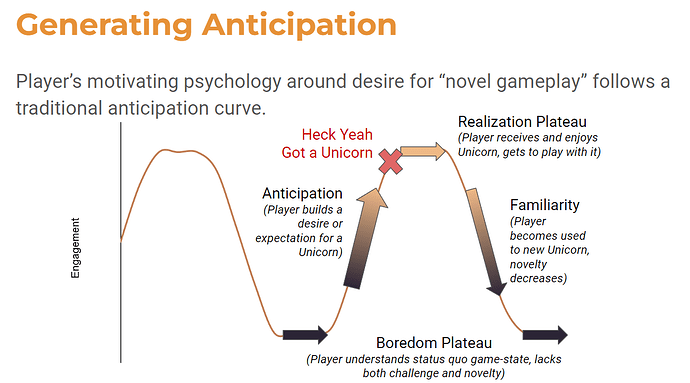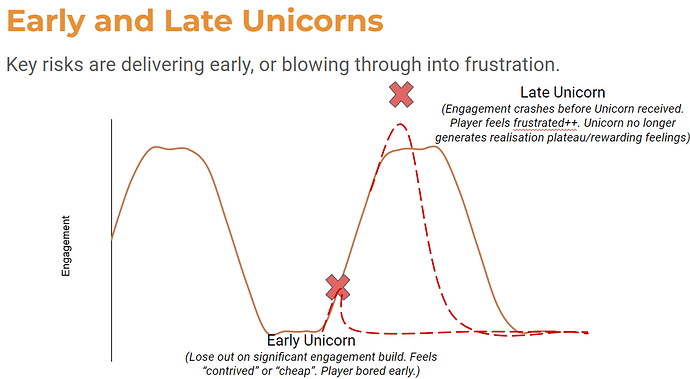Hi, yes, hello! I would love to speak to this, because I have it on my mind almost consistently! I’m looking at a similar problem at work: Players want 5-star Gacha characters, but if you just give them 5-Star characters they don’t appreciate them, right?
So let’s talk about the real feelings behind it, for want of a better term. I promise you the issue isn’t that it feels contrived because pssst everything in RPGs is contrived. It is all deliberately created by us or system in some way, and that’s not a bad thing, right? I think I hear your understanding of that when you hesitate around the word contrived and say “something irks you” about it. The issue, as far as I can tell, is that it doesn’t give a feeling of build and success. It doesn’t feel “earned” some would say.
Same for the other version, but in the other direction. It feels earned. It’s earned. It’s so earned. Why isn’t it fucking here I fucking earned this piece of shit unicorn! Okay now I’m over it. I get the unicorn, yeah sure whatever, I’m kind of past it now.
So, let’s start at what “good feelings” look like for getting something novel (new spells, new rules, magic items, unicorns):
This is what’s called an anticipation curve, and it requires 3 things: A baseline, deviation from baseline (upcurve) driven by players WANTING something, and a point where the player receives a thing (red X). The natural response is to return to baseline (which we want, so that we can generate a new anticipation curve!)
So you’ve got baseline, and, if the player is asking for a Unicorn, they’re juuuuuust starting the uptick on their building anticipation. You’re totally right, if we give it too early, we’re bored. If we give it too late, though, as you said in your 1d6 example, we blow through it!
How do we keep it in the sweet spot? Well…there’s a few methods that are in-use across industry:
1. Save-and-Spend
This is giving it a price that is above the Player’s current holdings, and letting them save toward it. An example of this is Tom Nook’s loan in Animal Crossing. Take a soft currency, that is easily fungible, with clear avenues for players to earn it, and give it a price. This is what Vanilla World of Warcraft did with mounts. MOUNT, you want a mount? 40 fucking gold. Good luck, nerd.
FATE: You want to assert you have something, it’ll cost you a Fate point which will cost you a complication. Etc.
Key Benefits:
Players can self-direct the farming. Fungible currency means they aren’t locked into one progression path if something else comes along. Very hands-off approach.
Key Risks:
Overall very weak at anticipation building. Currency collection is too predictable, so players don’t get interested until they’re close. In fact the hardest part of this is just getting players to start caring at the beginning (“1000 gold for a mount. Might as well be a billion, I’m gonna give up.” for more see Millennial’s buying houses…or not buying houses, as it were.).
Your currency needs to be fun to earn as part of your core loop. Players will chase efficiency over fun, so if grinding peacebloom in starter areas is the most efficient way to make money, that’s what they’ll do until they crash their own engagement curve. Gotta be good with your economy and pricing too, as price moves it up and down the curve (as a function of playtime).
2. Blueprint-and-Build
This involves giving your players a Blueprint (clear directions) on what they need to achieve the thing. This is Dungeon World’s Ritual move (Players ask for an effect, GM tells them how to achieve it via steps). This is the pokemon chain that says “get 8 gym badges then you can defeat the elite four”.
D&D’s main pathway to magic items: To get the Sunsword you must adventure into the Red Temple and fight the Lich, taking the sword from his body (okay to get to the red temple I need…to beat a lich I need…)
Key Benefits:
Allows for short- and medium-term rewards to sustain engagement over time (“Defeat 8 gym leaders” = “new town” Anticipation “Defeat Brock” REWARD PLATEU, “New town” Anticipation “Defeat Misty” REWARD PLATEAU. Little hops are great.
Key Risks:
No fungibility means that player needs to ensure they’re on the right track. Falling off the track is a massive impact on player engagement with game overall. Not a good plan for players like me who seek novelty again and again (to mitigate players like me, break my reward into small parts and distribute as they pass each medium-term milestone [not the unicorn! “Here, have these hooves”]). An example of looking after me is “I want a bow that shoots elemental arrows!” “okay, step one, you get a magic bow. Step 2 you get fire arrows, then you get ice arrows, then you get light arrows”.
3. Total Pity Timer
A total pity timer says “we’ll give you a roll on a d100 table, and if you don’t get it in 70 rolls, you get it”. The total pity timer needs to be before the engagement crash, but the “I could get it any time” builds anticipation like a motherfucker. Like, imagine if I got it on the first roll! How great would that be?!
Hearthstone does this with legendary cards. Pull 100 cards and no beuano? Your next pull is guaranteed. Key design choices are “do you reveal the pity timer to them or not”. Not generates more compulsive behaviour, revealing it generates more calculative behaviour. Pick your poison.
Rarely used in
Key Benefits:
All the fun of gambling without the chance of blowing out the top of your curve.
Key Risks:
Getting it first roll will still crash your curve (though not as bad). Need to make sure your chance is high enough to be worth it, but low enough that they’re not ACTUALLY gonna get it early.
Player feels very out of control, depending on how they generate rolls. This is why people on slot machines have rituals and prayer, because they don’t feel in control and are desperately trying to reassert that.
4. Incremental Pity Timer
“We’ll roll the d100, and every time you don’t get it we’ll add +1 to your roll next time. So EVENTUALLY you’ll get it, and every roll your chance goes up!”. A lot of games do this for little things like ammo. Zelda speedruns take advantage of this with bombs (chance goes up as your bomb count goes down). You pretty much have to reveal this or you’ll just be stuck in compulsive loops. Check the Key Risks on this.
Used a lot in Crit tables, like FFG’s Genesys: die on d100 table result of 130. Every other result is a critical injury. You roll +10 per injury (so +7 injuries, your table is d71-d170 and d130+ is death)
Key Benefits:
Builds chance as player builds anticipation. Really nice 1:1 alignment.
Key Risks:
Can cause players to value a roll as nothing more than “+1 to my next one”, which is a bit of a braindead short- or medium-term goal. Definitely don’t want them to be like “yeah just roll it so we can move on and I can grind out the next roll so I can grind out the next roll so I can grind out the next roll so that I can one day get it”. Kind of can have the same problems as “save-and-spend” but the perceived currency is “rolling”. Also, can have really bad feelings if the chance is too low (like if your Total pity timer is too high)
In both Pity Timer/Roll methods you can ease the burn by having some Non-Unicorn rewards. But that means I have to mention:
5. Unicorn Jackpot with High Volatility Payout
This is what slot machines do. Small payouts below the players input with a promise of a massive payout if they just keep trying. “you’ll get the unicorn if you roll max on a d1000 table! But this time you wiiiiiin A CHICKEN!” It maintains engagement for a long time because human brains are broken as fuck. It’s dogshit. Don’t do it. You’re better than this.
No RPG I know uses this. Good. If one does, I don’t want to know about it, just burn it.
Key Benefits:
Shackles your players to the behaviours you want. You get a special place in game design hell reserved just for you.
Key Risks:
You’re a monster.
Open to questions!

